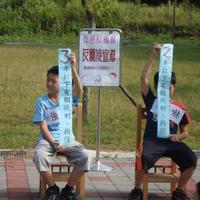#173:校园 霸凌
campus|bullying
#173: Mobbing in der Schule
#173: Acoso escolar
#173 : Le harcèlement scolaire
#173: Bullismo a scuola
#第173回:学校でのいじめ
#173: 학교 괴롭힘
#173: Bullying na escola
#173: Издевательства в школе
# 173: Campus Bullying
2016 年 12 月 ,北京 中关村 二小 的 一 位 学生 家长 在 网络 上 发布 了 一 篇 文章 ,提到 自己 的 孩子 遭遇 校园 霸凌 ,事后 出现 了 入睡 困难 、易怒 、极度 需要 陪伴 和 情绪 激动 等 症状 。
year 2016|December|Beijing|Zhongguancun|Second Primary School|attributive marker|||student|parent|at|internet|on|publish|past tense marker|||article|mentioned|own|attributive marker|child|encountered|campus|bullying|afterwards|appeared|past tense marker|sleep|difficulties|irritability|extreme|need|companionship|and|emotions|agitation|etc|symptoms
En diciembre de 2016, la madre de un alumno de la escuela primaria Zhongguancun nº 2 de Pekín publicó un artículo en Internet sobre la experiencia de acoso escolar de su hijo, a la que siguieron síntomas como dificultad para dormir, irritabilidad, necesidad extrema de compañía y agitación.
En décembre 2016, un parent d'élève de l'école primaire Zhongguancun n° 2 de Pékin a publié sur Internet un article relatant l'expérience de son enfant en matière de harcèlement scolaire, qui a été suivie de symptômes tels que des difficultés à dormir, de l'irritabilité, un besoin extrême de compagnie et de l'agitation.
У грудні 2016 року мати учня пекінської початкової школи № 2 Чжунгуаньцунь розмістила в інтернеті статтю про те, що її дитина зазнала шкільного булінгу, який супроводжувався такими симптомами, як труднощі зі сном, дратівливість, надмірна потреба в спілкуванні та збудження.
In December 2016, a parent of a student from Beijing Zhongguancun No. 2 Primary School published an article online, mentioning that their child had encountered campus bullying, which resulted in symptoms such as difficulty sleeping, irritability, extreme need for companionship, and emotional agitation.
家长 在 文 中 质疑 学校 对 这 件 事情 处理 不当 。
parents|in|text|in|question|school|regarding|this|matter|issue|handle|improperly
En el artículo, los padres cuestionaban la mala gestión del caso por parte de la escuela.
Dans l'article, les parents mettent en cause la mauvaise gestion de l'affaire par l'école.
The parent questioned the school's improper handling of the situation in the article.
这 几乎 是 “校园 霸凌 ”第一次 如此 大 面积 地 进入 公众 视野 。
this|almost|is|campus|bullying|first time|so|large|area|adverbial marker|enter|public|view
Es casi la primera vez que el "acoso escolar" sale a la luz pública a tan gran escala.
Це чи не вперше, коли "шкільний булінг" потрапив у поле зору громадськості в такому широкому масштабі.
This was almost the first time that "campus bullying" entered the public eye on such a large scale.
在此 之前 ,中文 网络 上 更 常用 的 词语 是 :校园 暴力 、校园 欺凌 。
before this|before|Chinese|internet|on|more|commonly used|attributive marker|words|is|campus|violence|campus|bullying
Anteriormente, los términos más utilizados en Internet en China eran: violencia escolar y acoso escolar.
Before this, the more commonly used terms on Chinese internet were: campus violence, campus bullying.
霸凌 ,是 直接 从 英文 “bullying”音译 过来 的 。
bullying|is|directly|from|English||transliteration|come over|attributive marker
Bullying se traduce directamente de la palabra inglesa "intimidación".
Bullying is directly transliterated from the English word 'bullying'.
很多 家长 都 非常 关注 这 件 事情 。
many|parents|all|very|pay attention to|this|matter|thing
De nombreux parents sont très préoccupés par cette question.
Many parents are very concerned about this matter.
网上 也 有 不少 人 回忆 了 自己 年少 时 遭遇 校园 霸凌 的 经历 。
online|also|have|many|people|recall|past tense marker|own|youth|time|encountered|campus|bullying|attributive marker|experience
Many people online have also recalled their experiences of being bullied in school during their youth.
校园 霸凌 一直 存在 ,只是 过去 被 大家 忽略 了 。
campus|bullying|always|exist|just|in the past|by|everyone|ignore|emphasis marker
El acoso en las escuelas siempre ha existido, sólo que en el pasado se ha pasado por alto.
Campus bullying has always existed, it was just ignored by everyone in the past.
很多 家长 或 老师 觉得 : 学生 之间 只是 闹着玩 的 。
Muchos padres o profesores piensan que los alumnos sólo juegan entre ellos.
Many parents or teachers think: students are just playing around.
又 或者 :孩子 不 懂事 ,长大 了 就 好了 。
again|or|child|not|sensible|grow up|emphasis marker|then|be fine
O bien: el niño no entiende y estará bien cuando crezca.
Or: the child is immature, they will be fine when they grow up.
随着 心理 健康 知识 的 普及 ,越来越 多 的 人 意识 到 校园 霸凌 的 严重性 。
with|psychological|health|knowledge|attributive marker|popularization|more and more|many|attributive marker|people|awareness|to|campus|bullying|attributive marker|seriousness
Con la difusión de los conocimientos sobre salud mental, cada vez más personas son conscientes de la gravedad del acoso en las escuelas.
With the popularization of mental health knowledge, more and more people are realizing the seriousness of campus bullying.
正视 它 的 存在 只是 第一步 ,如何 更好 地 解决 这个 问题 ,无论 是 学校 、老师 还是 家长 都 有 很 长 的 路 要 走 。
face up to|its|attributive marker|existence|just|the first step|how|better|adverbial marker|solve|this|problem|regardless of|is|school|teachers|or|parents|all|have|very|long|attributive marker|way|need|to go
Afrontar su existencia es sólo el primer paso, y queda mucho camino por recorrer para que escuelas, profesores y padres resuelvan mejor el problema.
Faire face à son existence n'est qu'un premier pas, et il reste un long chemin à parcourir pour que les écoles, les enseignants et les parents résolvent mieux le problème.
Facing its existence is just the first step. How to better solve this problem is a long road for schools, teachers, and parents.
注 :文 中 提到 的 文章 是 《 每 对 母子 都 是 生死 之 交 ,我 要 陪 他 向 校园 霸凌 说 NO !
note|text|in|mentioned|attributive marker|article|is|every|pair|mother and son|all|are|life and death|attributive marker|bond|I|want|accompany|him|towards|campus|bullying|say|no
Nota: El artículo mencionado en el artículo es "Cada madre y su hijo son amigos para toda la vida, quiero acompañarle a decir ¡NO al acoso escolar!
Note : L'article mentionné est "Chaque mère et chaque enfant est un ami pour la vie, je veux l'accompagner pour dire NON au harcèlement scolaire !
注:記事内で言及されている記事は「母子は生死の友。校内いじめにNOを言うために私も同行したい!」です。
Note: The article mentioned in the text is "Every Mother and Child Are Life and Death Friends, I Want to Accompany Him to Say NO to Campus Bullying!"
》 。
》。
".
SENT_CWT:AsVK4RNK=16.44 PAR_TRANS:gpt-4o-mini=3.27 SENT_CWT:AsVK4RNK=6.62 PAR_TRANS:gpt-4o-mini=1.9
en:AsVK4RNK en:AsVK4RNK
openai.2025-02-07
ai_request(all=19 err=0.00%) translation(all=15 err=0.00%) cwt(all=207 err=7.25%)

